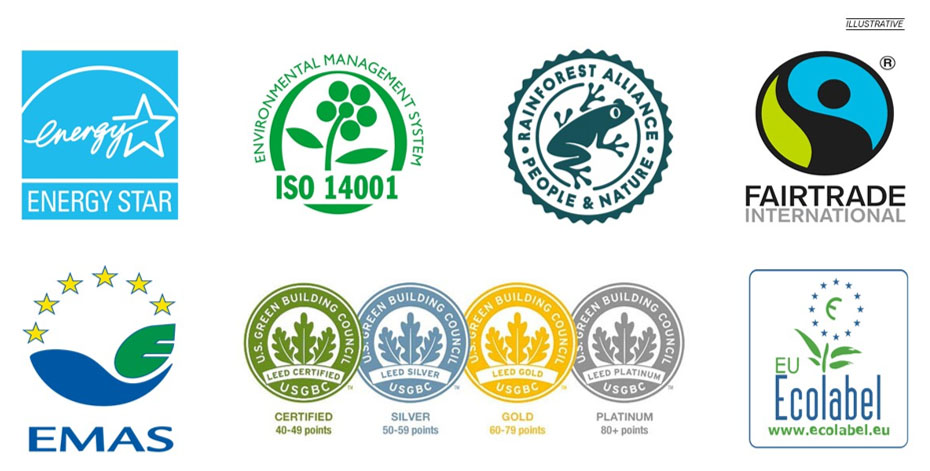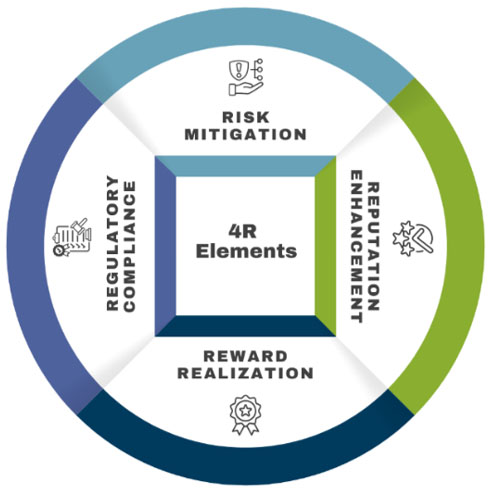Avalon Consulting’s Ayush Patodia, Ridhi Kukreja and Jital Akabari collaborated to author a blog on how sustainability labels are becoming critical tools for companies aiming to meet ESG goals and build consumer trust. These certifications enhance compliance, brand reputation, and risk mitigation while responding to rising demand for transparency. Despite adoption challenges like cost and greenwashing, a strategic approach using the 4Rs—Regulatory, Reward, Reputation, and Risk—can drive long-term value. As global standards evolve, sustainability labels are set to become integral to business models worldwide.
In today’s world, sustainability is no longer a buzzword but a necessity. As consumers and businesses become more environmentally conscious, the demand for sustainable products and business practices has surged. This shift has given rise to sustainability labels, which serve as a beacon for eco-friendly choices and sustainability standards.
The Role of Sustainability Labels
Globally, sustainability labels have become a crucial tool in promoting sustainable development within the Environmental, Social and Governance area. There are more than 300 labels, and they differ in many ways, hence it gets hard to navigate for companies seeking certification, as well as for consumers who wish to make choices based on credible sustainability labels.
Some prominent labels under ESG practices could be-
- Environmental certifications (e.g., Energy Star, EU Ecolabel, LEED Green Buildings, etc.)
- Social certifications (e.g., Rainforest Alliance Certified, Fairtrade, etc.)
- Governance certifications (e.g., EMAS, ISO 14001, etc.)

In developing countries, sustainability labels are also gaining traction. The Rainforest Alliance certification, for example, supports sustainable agriculture by promoting practices that conserve biodiversity and ensure fair treatment of workers. These labels not only help in protecting the environment but also in improving the livelihoods of local communities.
Why Are Companies Going for Sustainability Labels?
It is important to understand why companies are pursuing these certifications and why it has become a business imperative. Companies pursue sustainability certifications not just for ESG reasons, but to benefit from the 4R Elements:
- Regulatory Compliance: With stricter environmental laws, sustainability labels ensure companies meet ESG standards and avoid fines.
- Reward Realization: Sustainable practices boost efficiency, retain talent, attract investors and align with consumer preferences, adding value to all the stakeholders.
- Reputation Enhancement: Labels build trust with consumers, showcasing ethical practices and giving a competitive edge. According to a study by Nielsen, 65-70% of global consumers are willing to pay more for sustainable brands.
- Risk Mitigation: They help identify and reduce environmental or social risks, protecting the company’s reputation and financial stability.

Challenges to Adoption of Sustainability Labels
Adopting sustainability labels can be challenging for businesses, especially pressure to demonstrate environmental and social responsibility grow. One major issue is greenwashing, where companies make misleading or exaggerated claims about their products’ environmental benefits. A 2021 European Commission study found that 42% of green claims were deceptive, and as consumers become more aware, businesses risk damaging their reputation.
Why do companies resort to greenwashing? Many pursue sustainability certifications without meeting the necessary standards due to the high costs involved, including product development, compliance, and external consultations. These costs are often prohibitive, especially since sustainability labels are not always mandatory. Companies also struggle with compliance due to inadequate measurement systems—how can they improve without tracking key data?
Additionally, some certifications require adherence to best practices across the entire supply chain. For businesses renting facilities, particularly in markets like India, convincing landlords to invest in sustainable measures like renewable energy can be nearly impossible. This is compounded by the fact that sustainability certifications are more prevalent in Western markets, creating a disconnect in regions where such labels are still emerging.
Ultimately, the high cost of compliance and evolving regulations make it challenging for businesses to adopt sustainability labels effectively. Navigating these complexities is essential to maintain credibility and meeting consumer expectations.
Label Selection and Best Practices
Selecting the right labels is key, considering the significant investments of time, money, and management attention that can be consumed by the certification process. With 300+ such labels worldwide, selecting a suitable sustainability label is directly linked to the company’s ESG strategy.
The first step is to identify objectives, whether it’s risk mitigation, reputation enhancement, rewarding sustainability practices, or meeting regulatory requirements. These 4Rs will guide the decision-making process.
Next, conduct a market study to evaluate the certifications available and determine which ones align with the goals/objectives. Consider if the certification is a regulatory requirement (either current or upcoming), if customers demand it and are willing to pay a premium, and if investors value it. Additionally, check if competitors are pursuing similar certifications to stay competitive.
It is essential to assess the cost and time of compliance. Evaluate the certification’s requirements and whether it’s feasible for the business to meet them. Consider the financial and time investments required—how much will the certification cost, and what ROI will it provide? Does it align with both the short-term and long-term business goals?
By carefully evaluating these factors, a business can make an informed decision on whether pursuing a sustainability label is a strategic investment that aligns with business objectives and delivers tangible benefits.
Top global companies follow a strategic roadmap to select the appropriate label as per their ESG practices to enhance their credibility and commitment, some of the prominent examples are-
- Companies like Unilever and Nestlé pursue multiple certifications, such as ISO 14001 for environmental management and Fairtrade for ethical sourcing, to cover various aspects of sustainability
- Companies like IKEA and Apple publish detailed sustainability reports, outlining their progress and challenges. They use certifications like LEED for their buildings and ENERGY STAR for energy efficiency
- Brands like The Body Shop and Lush actively educate consumers about the significance of their sustainability labels, helping them make informed choices
- Leading firms ensure their sustainability claims are verified by credible third-party organizations. For example, Patagonia uses certifications like Fair Trade Certified to validate their sustainable practices
Future of Sustainability Labels
The future of sustainability labels in business is already unfolding, driven by the 4Rs. Companies adopt sustainability labels not only to support ESG goals but to gain a competitive edge, meet consumer demand, attract investors, and comply with evolving regulations. These motivations are dynamic and vary across industries and regions.
As consumer and investor preferences increasingly prioritize sustainability, companies must align with these expectations to stay relevant. Labels also help ensure regulatory compliance as stricter environmental laws are enacted worldwide. For businesses in emerging markets like India, sustainability labels are vital for meeting export market demands.
As sustainability regulations and certifications evolve, businesses must remain flexible in their strategies. In the future, sustainability labels will be deeply integrated into business models, influencing everything from product development to brand reputation, positioning companies to build trust, attract investment, and secure long-term success in a sustainable world.
Conclusion & Recommendations
Sustainability labels are essential in promoting sustainable development globally. They provide a clear and reliable way to identify sustainable products and businesses, empowering consumers and companies to make eco-friendly choices.
The key to selecting the right sustainability label lies in aligning it with your ESG strategy along with the 4Rs. As we strive for a more sustainable future, the importance of these labels will grow, requiring more attention from businesses and each company has unique sustainability goals, hence necessitating tailored advice. However, by adopting these labels and their practices, we can collectively contribute to a healthier, more sustainable world.









